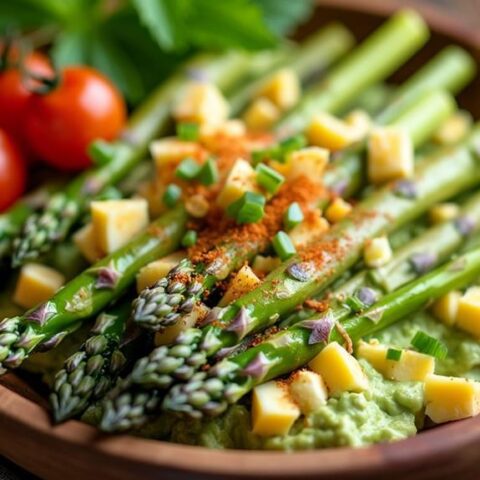
Mandarins are not considered low-carb fruits, containing approximately 12 grams of carbohydrates per medium-sized fruit, with 10.1 grams of net carbs after subtracting fiber. While they offer valuable nutrients like vitamin C and potassium, their carbohydrate content exceeds typical keto diet limits. For those following low-carb diets, alternatives like lemons and limes provide similar citrus benefits with considerably fewer carbs, at 5-6 grams per serving. Understanding smart portion control and alternatives can help maintain a balanced approach.
Key Takeaways
- Mandarins contain 12 grams of carbohydrates per medium fruit, making them relatively high in carbs for low-carb diets.
- One mandarin can use up most of a keto dieter's daily carb allowance, making them unsuitable for strict ketogenic diets.
- Lemons and limes are better low-carb citrus options, containing only 5-6 grams of net carbs per serving.
- Despite higher carbs, mandarins offer valuable nutrients including vitamin C, potassium, and fiber.
- Alternative ways to enjoy citrus flavor include using mandarin zest, extracts, or smaller portions to manage carb intake.
Understanding Mandarin Carbohydrate Content
When evaluating mandarins for a low-carb diet, understanding their carbohydrate content becomes essential for making informed dietary decisions. A medium mandarin orange contains approximately 12 grams of carbohydrates, with net carbs reaching 10.1 grams after subtracting fiber content.
While these citrus fruits offer significant health benefits, including high Vitamin C content, their carb count presents challenges for those following restrictive eating plans.
Despite packing powerful nutrients like Vitamin C, mandarins may not fit within the strict carbohydrate limits of some diet plans.
For individuals adhering to a strict keto diet, the carbohydrate content of Mandarin oranges can be problematic, as it represents a substantial portion of the daily 20-50 gram carb allowance.
At 13.34 grams of carbohydrates per 100-gram serving, mandarins have a relatively high carbohydrate content compared to other fruits, making them less suitable for low-carb dietary approaches despite their nutritional value.
The Truth About Mandarins and Ketosis
Although mandarins offer numerous nutritional benefits, their relationship with ketosis presents significant challenges for individuals following a ketogenic diet. With approximately 11.54 grams of net carbs per 100 grams, mandarins can quickly consume a significant portion of the daily carb allowance, potentially disrupting ketosis and affecting blood sugar levels.
While these citrus fruits provide essential vitamins and minerals, their high carbohydrate content makes them problematic for those strictly monitoring their carb intake. A single medium mandarin contains around 10 grams of net carbs, which represents a substantial portion of the typical 20-50 gram daily limit on a ketogenic diet.
For those seeking citrus flavors while maintaining ketosis, alternatives such as low-carb fruits like berries or small amounts of lemon and lime juice provide better options. Additionally, increased protein intake on a keto diet helps maintain muscle mass and enhances feelings of fullness, which can further aid in weight management.
Nutritional Breakdown of Fresh Mandarins
Fresh mandarins pack a remarkable nutritional profile within their small, vibrant packages. A detailed nutritional breakdown reveals that a medium mandarin, weighing approximately 88 grams, contains just 47 calories while delivering 12 grams of carbs.
Despite their compact size, mandarins offer impressive nutrition, packing just 47 calories and 12 grams of carbs in each 88-gram fruit.
When examining mandarin oranges more closely, the presence of dietary fiber reduces their net carbs to a more modest level, with 100 grams containing 11.54g net carbs after accounting for fiber content.
These citrus fruits excel in their micronutrient content, providing 26% of the daily vitamin C requirement in a single fruit. They're also rich in essential minerals, particularly potassium at 166mg per serving, supporting cardiovascular health.
The fiber content serves a dual purpose, promoting digestive health while helping maintain satiety, making mandarins a nutrient-dense choice for health-conscious consumers.
How Mandarins Compare to Other Citrus Fruits
Compared to other citrus fruits, mandarins occupy a distinct position on the carbohydrate spectrum, containing approximately 11.54 grams of net carbs per 100 grams. This carb count places them higher than lemons and limes, which contain roughly 5-6 grams of net carbs per 100 grams, and grapefruits, which have about 8.1 grams.
While mandarins are nutritious and provide significant vitamin C content at 26.7 mg per 100 grams, other citrus fruits offer similar health benefits with lower carbohydrate levels.
Sour oranges, for instance, contain about 7.5 grams of net carbs per 100 grams, making them a more suitable option for those following low-carb diets.
This food comparison reveals that while mandarins are a healthy choice, their higher carb content may require careful consideration for carb-conscious consumers.
Smart Ways to Enjoy Mandarins on a Low-Carb Diet
Following a low-carb diet doesn't mean completely eliminating mandarins, as careful portion control allows for occasional enjoyment of small segments without derailing dietary goals.
Those seeking the bright citrus taste can incorporate mandarin zest or extracts into their cooking, providing flavor without significant carbohydrates.
Pairing mandarin segments with healthy fats like nuts or cheese helps create satisfying combinations while moderating the fruit's overall carbohydrate impact on blood sugar levels.
Portion Control Is Key
Successfully incorporating mandarins into a low-carb diet requires thoughtful attention to portion sizes, as even these small citrus fruits can impact daily carbohydrate limits. Understanding portion control strategies can help maintain ketosis while enjoying their vibrant flavor and nutritional benefits.
| Portion Size | Net Carbs | Suggested Use | Pairing Options |
|---|---|---|---|
| Whole mandarin | 10.1g | Occasional treat | Cheese or nuts |
| Half mandarin | 5.05g | Daily snack | Greek yogurt |
| Quarter mandarin | 2.5g | Garnish | Salad greens |
| Single slice | <1g | Recipe accent | Protein dishes |
To maximize enjoyment while minimizing carb intake, consider using mandarin segments as garnishes for salads or pairing small portions with high-fat foods. This approach allows for the bright citrus flavor while maintaining daily carb goals and ensuring balanced nutrition.
Substitute With Citrus Extracts
Several citrus extracts offer a practical solution for low-carb dieters seeking to capture the bright, zesty flavor of mandarins without the accompanying carbohydrates.
Orange extract and other citrus concentrates provide intense flavor while contributing minimal net carbs to recipes.
For those following low-carb diets, orange zest and dried orange peel serve as excellent alternatives, delivering robust citrus notes with markedly fewer carbohydrates than whole fruit.
Citric acid can be incorporated to achieve the characteristic tanginess of mandarins without adding carbs.
While crystallized orange products are available, they fall into the "dirty keto" category due to added sugars and should be used sparingly.
These substitutes maintain a similar flavor profile to fresh mandarins while helping individuals stay within their carbohydrate limits.
Combine With Healthy Fats
While mandarins contain higher carbohydrate levels than many low-carb foods, pairing them with healthy fats can create a more balanced and diet-friendly option.
With approximately 11.54g of net carbs per serving, mandarins can be strategically combined with fats to help minimize blood sugar spikes and enhance satiety.
Adding mandarins to dishes rich in healthy fats offers versatile ways to enjoy this citrus fruit while maintaining a low-carb lifestyle.
Practical combinations include enjoying mandarin segments with avocado slices, incorporating them into salads dressed with olive oil, or serving them with a dollop of whipped cream for a satisfying low-carb snack.
For those seeking the citrus taste without significant carb content, mandarin zest can be used to flavor fatty proteins like roasted chicken or fish.
Keto-Friendly Alternatives to Fresh Mandarins
While fresh mandarins may prove challenging for those following a ketogenic lifestyle, several low-carb alternatives can satisfy citrus cravings without compromising dietary goals. Berries offer a suitable replacement with roughly half the carbohydrate content of mandarins, while lemon and lime provide intense citrus flavor with minimal impact on daily carb limits. For those seeking mandarin's distinctive taste in cooking, orange zest and dried peel deliver the desired citrus notes without the sugar content of the whole fruit. Those on a keto diet need to be mindful of blood glucose levels when selecting fruits, as maintaining steady blood sugar is essential for effective diabetes management.
Low-Carb Citrus Choices
Although mandarins offer delightful citrus flavors, their relatively high carbohydrate content makes them challenging to incorporate into low-carb or ketogenic diets. At 11.54 grams of net carbs per 100-gram serving, Mandarin oranges exceed the strict carbohydrate limits of most keto diets.
Fortunately, several low-carb alternatives can satisfy citrus cravings while maintaining ketosis. Lemon and lime provide bright citrus notes with minimal carbohydrate content, while orange zest and dried orange peel offer concentrated flavors perfect for cooking and baking.
For those seeking fresh fruits, berries like strawberries and raspberries deliver sweetness with fewer net carbs. When craving a rejuvenating drink, unsweetened sparkling water with citrus flavoring provides a zero-carb option that can help maintain commitment to a low-carb lifestyle.
Flavoring Without The Fruit
For those committed to a ketogenic lifestyle, several flavorful alternatives can replace fresh mandarins while maintaining strict carb limits.
Orange zest stands out as a versatile low carb option, delivering intense citrus flavors without significant carbohydrates. Dried orange peel offers similar benefits while providing extended shelf life and convenience.
Keto dieters can explore additional alternatives like orange extract, which provides concentrated flavoring without impacting carb counts.
Citric acid serves as an effective substitute in recipes requiring tanginess, while unsweetened sparkling water infused with natural citrus flavors offers a revitalizing zero-carb beverage option.
These alternatives enable individuals following ketogenic diets to enjoy mandarin-like flavors while adhering to their dietary requirements, making the shift to low carb eating more manageable and satisfying.
Tips for Managing Mandarin Cravings While Low-Carb
Managing mandarin cravings on a low-carb diet requires strategic alternatives and mindful substitutions. For those following a low-carb lifestyle, berries offer a satisfying alternative with considerably lower carb counts, while citrus-flavored alternatives can provide the desired tangy flavor without excessive carbohydrates. Including non-starchy vegetables like spinach and kale in your meal plan ensures you are getting essential nutrients without increasing carb intake.
| Strategy | Benefit | Implementation |
|---|---|---|
| Berry Substitution | Lower carb counts | Replace mandarins with strawberries |
| Citrus Alternatives | Familiar flavor | Use lemon or lime juice in meals |
| Meal Planning | Reduced temptation | Prepare keto-friendly options ahead |
To maintain success on a low-carb diet while managing mandarin cravings, staying well-hydrated and incorporating orange zest or dried peel can provide satisfying alternatives. Creating a structured meal plan that includes these alternatives helps guarantee readily available options when cravings strike.
Frequently Asked Questions
Can I Eat Mandarin on a Low Carb Diet?
Mandarins can fit into a low carb diet with strict portion control, but their high sugar content limits consumption. For better weight loss results, consider lower-carb healthy snacks while still obtaining citrus benefits.
How Many Mandarins Should I Eat a Day to Lose Weight?
For effective weight loss, limit mandarin consumption to 1-2 fruits daily, incorporating them as healthy snacks while practicing portion control. Balance daily calorie intake and consider other low-sugar fruit alternatives when meal planning.
Do Mandarins Have Carbs in Them?
Mandarins contain approximately 12 grams of carbohydrates per medium fruit, including 2 grams of fiber. While offering vitamin C and other nutrients, they're considered moderate-carb fruits compared to lower-carb alternatives.
Are Tinned Mandarins Good for You?
Tinned mandarins offer some nutritional benefits like preserved vitamins, but higher sugar content and reduced dietary fiber make them less healthy than fresh alternatives. Moderation in portion sizes is recommended when adding to meals.
Conclusion
While mandarins contain natural sugars and carbohydrates, they can still fit into a low-carb lifestyle when consumed mindfully. Understanding their nutritional content allows for informed decisions about portion sizes and timing. Those following strict ketogenic diets may need to limit or avoid mandarins, but moderate low-carb dieters can enjoy these fruits occasionally. With proper planning and portion control, mandarins can provide valuable nutrients without derailing low-carb goals.










No Comments